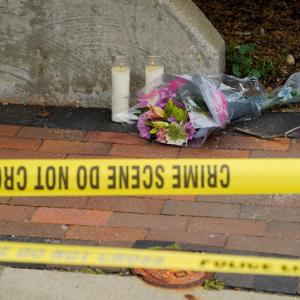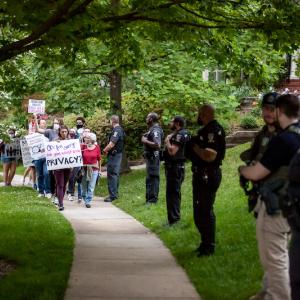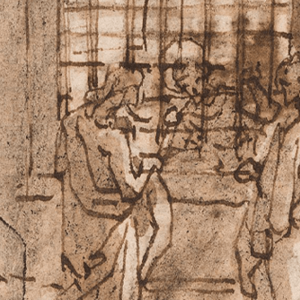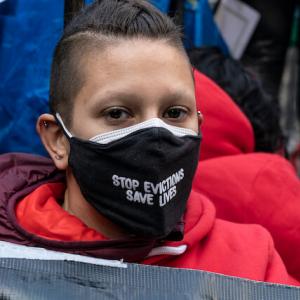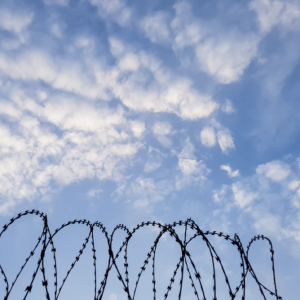
Hannah Bowman is a graduate student in religious studies at Mount Saint Mary's University, Los Angeles, a literary agent, and the founder and director of Christians for the Abolition of Prisons, where she writes and teaches on the Christian theology supporting abolition. You can follow her on Twitter @hannahnpbowman.
Posts By This Author
We Don’t Achieve Christian Unity by Avoiding Polarization
In my view, churches often demonize polarization because they know disruption can lead to conflict and upset the status quo. For example, prior to the 2020 racial justice uprisings, some churches were hesitant to even say “Black Lives Matter” because some Christians perceived it as a polarizing issue.
But when we avoid clarity about justice because it seems “divisive,” we misunderstand the nature of Christian unity. Some churches seek to preserve an ideal of “loving” unity by avoiding conflict among their members.
Parenting Is an Act of Faithful Community Building
What does it look like to parent children in line with the radical values of restorative justice and communal care in a world of injustice, where safety and community are not equally available to all? As the threats of fascism and climate change make parenting seem dangerous or even unethical to many people, what principles can guide us in the radical risk of making new life?
Wilderness, Highways, and Other Forgotten Advent Themes
God’s promise in Advent is about meeting us wherever we are. We, too, can go out and build relationships with all our neighbors — housed or unhoused, incarcerated or not — as we prepare for a future where all people can be comforted.
Criminalizing Abortion Prevents Compassionate Choices
Whether the restrictions that undermine compassionate decision-making are imposed by law or systemic inequalities such as poverty, the moral imperative to support careful, compassionate decision-making should drive public policy away from any such restrictions.
To End Gun Violence, We Need More Than Legislation
While reducing the prevalence of guns in our society is essential, I am wary of religious gun control efforts that focus primarily on federal gun legislation because laws ultimately rely on frameworks of punitive justice, criminalizing anyone who breaks the law. A holistic approach to gun violence should imagine new alternatives for a safer society — alternatives that go beyond the criminal legal system and gun control laws. To imagine these alternatives, we can turn to the lessons of the transformative justice movement, which seeks to address violence without relying on state violence, police, or prisons.
Protesting In Front of a Judge’s House Is an Act of Nonviolence
Christians are often unhelpfully wary of aggressive protest tactics. They promote a particular understanding of “unity” or “love” prioritizing “civility” over difficult conversations that lead to justice. Some Christians are even uncomfortable being present during debates or protests where activists utilize more aggressive tactics. But Jesus’ Sermon on the Mount and Paul’s letters to the church help Christians analyze power and privilege so that they can engage in healthy disruption and confrontation.
The Book of Job Offers an Alternative to Censorship
Through reclaiming missing stories and telling our own stories in terms that undermine dominant narratives, we affirm our humanity and agency, our ability to resist and interpret our lives as meaningful. We must theologically interrogate the way we tell stories and the temptation to censor marginalized people’s perspectives and histories in favor of a dominant narrative. This is because stories cut to the heart of how humans, created in the image of God, make meaning out of what happens to us.
What Does the Bible Say About Prisons?
Jesus’ “mission statement” when he begins his public ministry in Galilee includes a promise of liberation and release for those who are incarcerated. While the New Testament context of “captivity” wasn’t entirely the same as modern imprisonment, Jesus’ promise aligns liberation of prisoners with healing and good news for the poor and oppressed. Taking Jesus’ words in this text seriously forces us to ask: If God’s reign is characterized by freedom for prisoners, why are we supporting incarceration now?
How To Get Beyond Punitive Thinking in a Pandemic
Paul offers a reflection on accountability and community care when he uses the metaphor of a body for the community, writing, “If one member suffers, all suffer together with it; if one member is honored, all rejoice together with it” (1 Corinthians 12:26). Accountability requires seeing that we all belong to one another as members of the human community. This is why efforts to distinguish between the vaccinated and unvaccinated, the “healthy” and the “disabled,” the “deserving” and “undeserving” is antithetical to an ethic of accountability.
In Advent We Make Space for Jesus, Our Unhoused Neighbor
In Matthew 25:35, Jesus identifies himself with the stranger we welcome or exclude. Advent hospitality extends beyond our personal relationships and into the ways we structure our neighborhoods and our common life. But in the United States, our politics are driven by “NIMBYism” (“not in my backyard!”), as housed individuals and politicians not only demand the exclusion of unsheltered people from public spaces but also oppose the creation of shelters and permanent, affordable housing in our neighborhoods.
Prison Letters Are Essential to Our Faith
The Federal Bureau of Prisons is piloting a program to replace physical mail to prisoners with scanned copies, a program I believe is extremely unjust and has urgent implications for the practice of our faith, both for Christians who are incarcerated and Christians on the outside.
Encampments for the Unhoused Are Sacred Structures
Creating sacred space, whether in temporary dwellings or permanent homes, is ultimately about constructing community. Community creates safety through mutual care for one another. Often, the political response to unhoused people is instead based on the contrived premise that they are a danger to neighborhoods.
Abolition Is the Embodiment of God’s Justice
The U.S. prison system is an afront to human dignity and in sharp contrast with God's vision for justice on earth. Christians' commitment to love, hope, and justice should inspire us to work toward abolishing the prison system.




